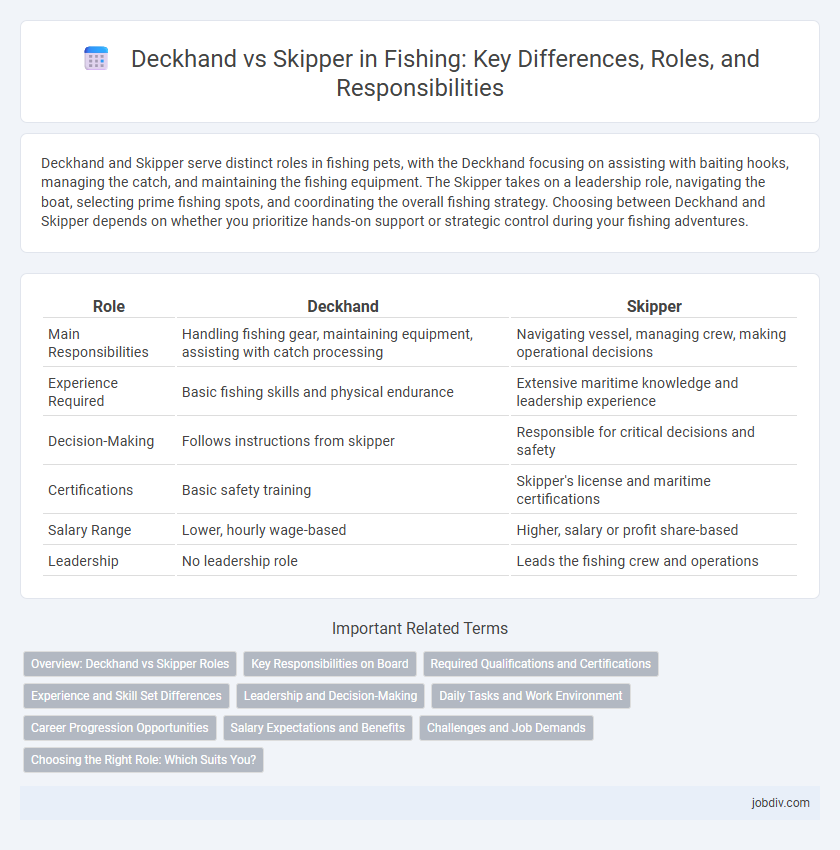Deckhand and Skipper serve distinct roles in fishing pets, with the Deckhand focusing on assisting with baiting hooks, managing the catch, and maintaining the fishing equipment. The Skipper takes on a leadership role, navigating the boat, selecting prime fishing spots, and coordinating the overall fishing strategy. Choosing between Deckhand and Skipper depends on whether you prioritize hands-on support or strategic control during your fishing adventures.
Table of Comparison
| Role | Deckhand | Skipper |
|---|---|---|
| Main Responsibilities | Handling fishing gear, maintaining equipment, assisting with catch processing | Navigating vessel, managing crew, making operational decisions |
| Experience Required | Basic fishing skills and physical endurance | Extensive maritime knowledge and leadership experience |
| Decision-Making | Follows instructions from skipper | Responsible for critical decisions and safety |
| Certifications | Basic safety training | Skipper's license and maritime certifications |
| Salary Range | Lower, hourly wage-based | Higher, salary or profit share-based |
| Leadership | No leadership role | Leads the fishing crew and operations |
Overview: Deckhand vs Skipper Roles
Deckhands perform essential tasks such as maintaining equipment, handling nets, and assisting with navigation, ensuring smooth daily operations on a fishing vessel. Skippers hold ultimate responsibility for vessel safety, navigation, and crew management, making critical decisions during fishing expeditions. The distinct roles complement each other, combining physical labor with leadership and strategic oversight for successful fishing trips.
Key Responsibilities on Board
A deckhand is responsible for maintaining the fishing gear, handling nets, sorting catches, and ensuring the deck is clean and safe. The skipper oversees navigation, manages the crew, plans fishing strategies, and ensures compliance with maritime laws and safety regulations. Both roles are essential for efficient fishing operations and vessel safety, with the skipper holding command authority and the deckhand performing critical support tasks.
Required Qualifications and Certifications
Deckhands require basic maritime safety training, including STCW Basic Safety Training, and must possess physical stamina and knowledge of fishing gear operation. Skippers need advanced certifications such as a captain's license (e.g., U.S. Coast Guard Master License or MCA Yachtmaster) and extensive experience in vessel navigation, crew management, and maritime law compliance. Both roles prioritize sea survival skills and first aid certification, but skippers carry added responsibilities necessitating formal leadership qualifications.
Experience and Skill Set Differences
Deckhands generally possess hands-on experience in handling fishing gear, maintaining the vessel, and assisting with catches, emphasizing physical stamina and teamwork skills. Skippers require advanced navigational expertise, leadership abilities, and a thorough understanding of maritime regulations to ensure safe and efficient fishing operations. The skill set of a skipper includes strategic decision-making and boat management, while deckhands focus on operational support and execution of tasks.
Leadership and Decision-Making
Skippers hold primary leadership roles on fishing vessels, responsible for making critical decisions regarding navigation, safety, and crew management. Deckhands support the skipper by executing tasks and providing feedback but generally have limited decision-making authority. Effective leadership from the skipper ensures operational efficiency and crew safety during fishing expeditions.
Daily Tasks and Work Environment
Deckhands handle physical tasks such as cleaning, baiting hooks, and hauling nets, often working long hours in varying weather conditions on deck. Skippers oversee navigation, vessel operation, and crew management, ensuring safety and compliance with maritime regulations from the captain's helm. The work environment for deckhands is hands-on and labor-intensive, while skippers operate in a more strategic and supervisory capacity, balancing both on-deck presence and command responsibilities.
Career Progression Opportunities
Career progression in fishing typically begins with roles like deckhand, where individuals gain hands-on experience with vessel operations and fishing techniques. Advancing to skipper involves acquiring leadership skills, navigational expertise, and certifications such as the captain's license, enabling management of the crew and decision-making responsibilities. Skippers often enjoy higher wages and greater career stability due to their pivotal role in vessel safety and fishing success.
Salary Expectations and Benefits
Deckhands typically earn an average annual salary ranging from $30,000 to $50,000, while skippers can expect salaries between $60,000 and $100,000, depending on experience and vessel size. Benefits for skippers often include higher bonuses, profit-sharing opportunities, and leadership incentives, whereas deckhands usually receive standard health coverage and basic overtime pay. Salary growth and added perks are closely tied to skill level and the responsibilities each role carries within fishing operations.
Challenges and Job Demands
Deckhands face physically demanding tasks such as handling heavy gear, maintaining the vessel, and managing catches under harsh weather conditions, requiring stamina and quick adaptability. Skippers carry the heavier responsibility of navigation, decision-making, crew safety, and compliance with maritime laws, demanding extensive experience and leadership skills. Both roles demand resilience and teamwork in unpredictable marine environments, but skippers shoulder greater strategic and operational challenges.
Choosing the Right Role: Which Suits You?
Selecting between deckhand and skipper depends on your skills, responsibilities, and leadership preferences. Deckhands perform manual labor, maintain equipment, and assist with fishing operations, ideal for those who enjoy hands-on tasks and teamwork. Skippers manage navigation, decision-making, and crew coordination, suited for individuals with experience, leadership qualities, and a strong understanding of maritime safety and fishing regulations.
Deckhand vs Skipper Infographic

 jobdiv.com
jobdiv.com